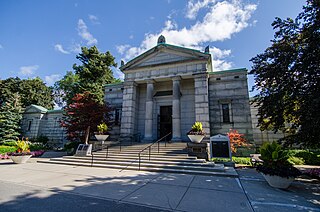
Mount Pleasant Cemetery is a cemetery located in Toronto, Ontario, Canada, and is part of the Mount Pleasant Group of Cemeteries. It was opened in November 1876 and is located north of Moore Park, a neighbourhood of Toronto. The cemetery has kilometres of drives and walking paths interspersed with fountains, statues and botanical gardens, as well as rare and distinct trees. It was originally laid out by German-born landscape architect Henry Adolph Engelhardt, inspired by the European and American garden cemeteries of the 19th century, and with influences from Mount Auburn Cemetery in Boston.

Raymond Hart Massey was a Canadian actor, known for his commanding, stage-trained voice. For his lead role in Abe Lincoln in Illinois (1940), Massey was nominated for the Academy Award for Best Actor. He reprised his role as Lincoln on television and in How the West Was Won (1962). Among his other well-known roles were Dr. Gillespie in the NBC television series Dr. Kildare (1961–1966), John Brown in Santa Fe Trail (1940) and Seven Angry Men (1955), Abraham Farlan in A Matter of Life and Death (1946), and Jonathan Brewster in Arsenic and Old Lace (1944).

Charles Vincent Massey was a Canadian diplomat and statesman who served as the 18th governor general of Canada from 1952 to 1959. Massey was the first governor general of Canada who was born in Canada.
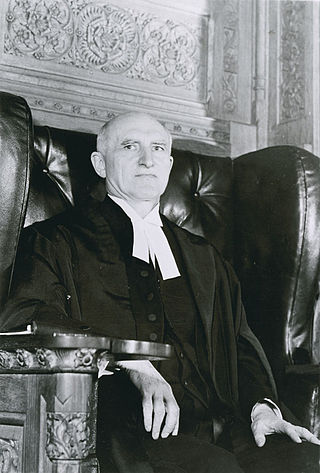
William Ross Macdonald, served as the 21st Lieutenant Governor of Ontario from 1968 to 1974, and as 22nd Speaker of the House of Commons of Canada from 1949 to 1953.

Massey Ferguson is an agricultural machinery manufacturer, established in 1953 through the merger of farm equipment makers Massey-Harris of Canada and the Ferguson Company of the United Kingdom. It was based in Coventry then moved to Beauvais in 2003 when the Coventry factory was shut down.

Daniel Massey was an American-born Canadian blacksmith and businessman in what is now Newcastle, Ontario. A member of the Massey family and a farm machinery pioneer, Massey began production of agricultural implements in 1847 and established what grew into Massey-Ferguson.
Denton Massey was a Canadian engineer, Anglican priest and politician.

Massey Hall is a performing arts theatre in Toronto, Ontario, Canada. Opened in 1894, it is known for its outstanding acoustics and was the long-time hall of the Toronto Symphony Orchestra. An intimate theatre, it was originally designed to seat 3,500 patrons, but after extensive renovations in the 1940s, it now seats only up to 2,765. It has an extensive history of concerts by artists of many musical genres which continues today.
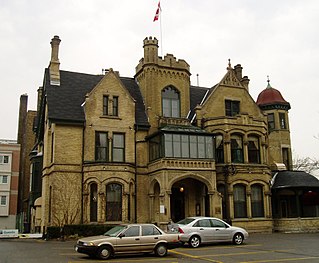
The Keg Mansion is a former residential building that is presently used as a location for a The Keg restaurant, in Toronto, Ontario, Canada. The building was initially known as Euclid Hall, a prominent downtown heritage building located at 515 Jarvis Street.

Hart House is a student activity centre at the University of Toronto. Established in 1919, it is one of the earliest North American student centres, being the location of student debates and conferences since its construction. Hart House was initiated and financed by Vincent Massey, an alumnus and benefactor of the university, and was named in honour of his grandfather, Hart Massey. The Collegiate Gothic-revival complex was the work of architect Henry Sproatt, who worked alongside decorator Alexander Scott Carter, and engineer Ernest Rolph, and subsequently designed the campanile at its southwestern corner, Soldiers' Tower. In 1957, the house hosted future U.S. President John F. Kennedy.

Newcastle is a community in the municipality of Clarington in Durham Region, Ontario, Canada. The community inherits the former name of the present-day municipality which it belongs to.
Varity was a Canadian multinational manufacturing company, created in 1986 from the remains of Massey Ferguson (MF) of Toronto, Ontario, Canada. Varity also owned Perkins Engines, headquartered in Peterborough, England, and Kelsey-Hayes Company, headquartered in Romulus, Michigan, as well as subsidiaries in many countries. After a period of corporate losses left MF insolvent, Varity was formed to detach the ownership of insolvent Massey Ferguson from its liabilities, including pension plans, and enable the Massey Ferguson brand and several subsidiaries to continue as working entities. By the year 2000, Varity itself was defunct, having successfully sold off its divisions.
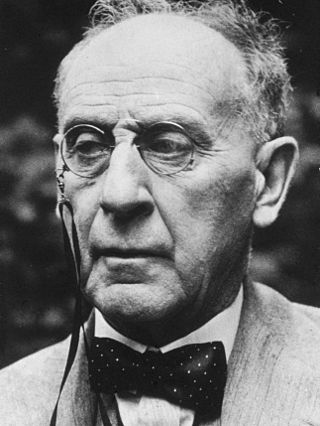
George MacKinnon Wrong was a Canadian clergyman and historian.

The Arts and Letters Club of Toronto is a private members' club in Toronto, Ontario, which brings together writers, architects, musicians, painters, graphic artists, actors and others working in or with a love of the arts and letters. It was founded in 1908 as a gentlemen's club, but women have been members since 1985.
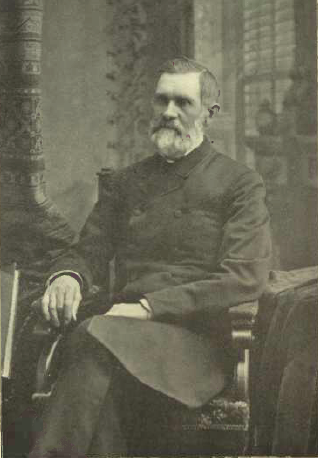
Hart Almerrin Massey was a Canadian businessman and philanthropist who was a member of the prominent Massey family. He was an industrialist who built the agricultural equipment firm that became Massey Ferguson, now part of AGCO.
The Massey Foundation was incorporated in 1918. It is responsible for the construction of many Toronto landmarks. It was the first trust of its kind in Canada.

Alice Parkin Massey was a Canadian philanthropist and the wife of Vincent Massey, who became Governor General of Canada shortly after Alice Massey's death.
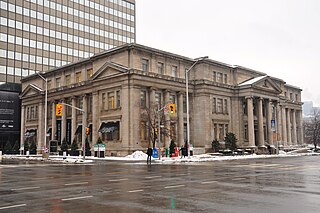
The Lillian Massey Building is a Neoclassical building located in Downtown Toronto, at the southeast corner of Queen's Park and Bloor Street along the Mink Mile and across from the Royal Ontario Museum. It was designed by architect George Martell Miller (1855–1933) and built between 1908 and 1912 for the University of Toronto's Household Science program created by Lillian Massey Treble, daughter of wealthy Canadian business man, Hart Massey. It presently houses the offices of the University of Toronto's Department of Classics and Centre for Medieval Studies and the offices of the University of Toronto's Division of University Advancement. Part of the building previously housed Club Monaco’s flagship retail store until 2021.

Lillian Massey Treble was a Canadian philanthropist and educator who was a member of the prominent Massey family.
Lionel Massey was a Canadian civil servant and dignitary, most noted for serving as Secretary to the Governor General of Canada during his father Vincent Massey's term as Governor General.

















